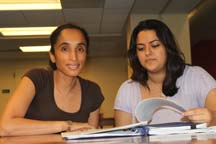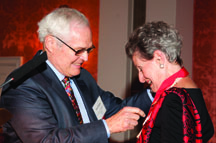Minors and Programs: Office of Undergraduate Research
Safa Ansari-Bayegan
“Everyone has a strong opinion about the death penalty,” said Honors junior and undergraduate
researcher Safa Ansari-Bayegan, including herself. But when she took a political science class from Dr. Alison Leland during her first semester in Honors, Safa realized she had not only a “more informed
opinion by the end of the class,” but also an ongoing interest in the topic.
The class included a visit from Kate Black of the Texas Defender Service, a non-profit organization that represents many death penalty cases, and when Safa heard that the group accepted undergraduates as interns, she began a multi-semester campaign to connect with them. Her persistence paid off with a summer internship, which, combined with a Summer Undergraduate Research Fellowship (SURF), allowed her to simultaneously work with the organization and pursue a research project.
After consulting with the organization on what area of the death penalty would be helpful research for them, Safa settled on an examination of a specific aspect of the Texas statute called future dangerousness. “It requires the jury to predict whether the defendant would be a continuing threat to society,” Safa said. Safa’s research had three goals: to examine any inherent problems with the question of future dangerousness, to understand its implication in sentencing, and to investigate how it plays a different role in Texas and other death penalty states.
During her internship, Safa summarized transcripts and examined court records, drafted motions and clemency petitions, and visited with clients on death row. She combined this work with interviewing experts on future dangerousness. “It’s kind of rare in the liberal arts to be able to go out in the field,” Safa said. But she was able to immerse herself not only with the lawyers at the Texas Defender Service, but also with members of the district attorney’s office, a defense attorney, a judge, and death row inmates, to get a “holistic view of things from people who deal with the death penalty and future dangerousness at different times in the process and with different motives.”
“Most of the research on future dangerousness has focused on an informative and statistical point of view, but I wanted to look at more of the philosophical question,” Safa explained. After extensive reading and interviews, her research found that many terms in the jury charge are vague and undefined and that the statute does not take into consideration the “changed conditions” the convict would face in prison.
Her SURF project has snowballed into ongoing statistical research with law school professor David Dow on the “question of whether future dangerousness has played this limiting role that it was intended to” and “whether the question positions a jury towards an automatic response—how much bias is in the question.” This research takes the form of “looking at the jury charges in life sentences without parole from 2005-2010 to see how those sentences were determined.” From a list of all life sentences over those five years, Safa calls the court clerks to obtain the jury charges, the document on which the jury foreman has indicated whether they found future dangerousness and whether they found mitigating circumstances. She looks to see how many times a life sentence was handed down with future dangerousness, how many where a jury saw no future dangerousness, and how many were based on mitigating factors.
While she continues to feel that there are no simple solutions around the death penalty, she said her research and time visiting with inmates has brought the “seriousness and poignancy” of the death penalty to her in a more personal way. “On the outside, people look mostly at the victim’s point of view, but now I also look at the defendant’s perspective.”
SURFers
In 2010-2011, the Office of Undergraduate Research supported a record 54 students in its Summer Undergraduate Research Fellowship (SURF) program, an increase of approximately 25% from the previous year. Projects ranged from measuring atmospheric ozone levels and meteorological data, to assessing and testing how hotel rooms are cleaned, to implementing a new tool to mathematically analyze and understand ancient masks.
Two 2011 SURF students had the privilege of presenting their research projects to the University of Houston System Board of Regents’Academic and Student Success committee meeting on November 15. Hamza Hallal spoke about his visual processing research project conducted under the mentorship of Dr. Haluk Ogmen, from the Department of Electrical and Computer Engineering. Iris Edelen, who worked with Dr. Norman Johnson from the Department of Decision and Information Sciences in the Bauer College of Business, talked about her research project involving best practices for companies utilizing Facebook.
Undergraduate Research Days
This year’s entire SURF class joined dozens of other student researchers to present posters at Undergraduate Research Day on October 13. The event is typically held in the Rockwell Pavilion at the M.D. Anderson Library, but with more than 100 presenters, this year students spread into the library’s study area and to the Honors College.
Undergraduate Research Day 2011 was such a success that there are plans to host a Spring Undergraduate Research Day on April 12. “We wanted to offer a venue for thesis students to present papers and for our semester researchers’ to present on their research projects,” said Karen Weber, director of the Office of Undergraduate Research. “Many of our student researchers were unable to present in the fall since they were just beginning their projects, and this spring event will enable them to share their work with the campus community.”

